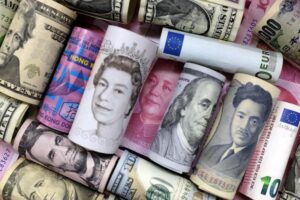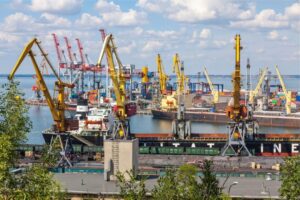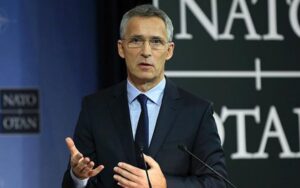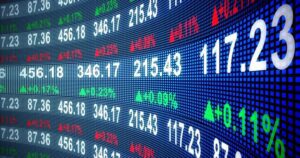
The dollar is moderately rising against a basket of major world currencies on Tuesday morning, strengthening for the fifth session in a row on expectations of new rate hikes by the Federal Reserve.
The ICE-calculated index, which shows the dynamics of the US dollar against six currencies (the euro, the Swiss franc, the yen, the Canadian dollar, the pound sterling and the Swedish krona), is growing by 0.24%, the broader WSJ Dollar – by 0.22%.
The euro/dollar pair is trading at $0.9687 by 8:53 pm compared to $0.9704 at the close of the session on Monday, the euro is losing about 0.2%.
The exchange rate of the US currency against the yen is 145.79 yen compared to 145.72 yen the day before, keeping close to the highest level in 24 years, which provokes expectations of new interventions to support the yen from the Japanese government.
The pound fell 0.3% to $1.1028 compared to $1.1057 at the close of the previous session.
By the beginning of next year, the level of the key interest rate in the US may slightly exceed 4.5%, according to the chairman of the Federal Reserve Bank (FRB) of Chicago, Charles Evans. According to him, the Fed will need to keep rates high for some time to cool the economy and the labor market.
Meanwhile, Fed Vice Chair Leil Brainard on the eve noted the need for tightening monetary policy to slow inflation, but added that the central bank’s decisions would depend on incoming statistical data.
The dollar also supports the demand for defensive assets, which increased after the speeches of the heads of the International Monetary Fund and the World Bank. In a joint event on Monday, they warned of rising risks of a global recession amid slower growth in advanced economies, record inflation and rising interest rates.
The IMF estimates that countries that account for about a third of global GDP will face at least two quarters of economic decline this year and next, and by the end of 2026 the global economy will lose about $4 trillion.

Stock indices of the Asia-Pacific region (APR) fall sharply during trading on Tuesday.
In particular, the pressure on the markets is exerted by the fall in the shares of the technology sector.
As reported, the US authorities last week introduced new restrictions on the supply of advanced chips and equipment for the production of semiconductors to China to prevent the development of the Chinese military industry through these products.
In addition, Asian markets are declining following the dynamics of Wall Street.
American stock indices fell on Monday for the fourth session in a row. At the same time, the value of the Nasdaq Composite fell to a minimum in more than two years – since June 28, 2020, according to Dow Jones Market Data.
The value of the Japanese index Nikkei 225 to 8:19 qoq decreased by 2.6%.
Japan’s current account surplus narrowed to 58.9 billion yen in August from 1.5 trillion yen in the same period a month earlier, according to Japan’s finance ministry. Analysts on average had forecast a surplus of 121.8 billion yen, according to Trading Economics.
Meanwhile, Japan’s services sentiment indicator rose 2.9 points in September from a month earlier, to a high since June of 48.4 points, according to Economy Watchers data.
Among the components of the index, Nidec Corp. shares are among the drop leaders. (-9.4%), SMC Corp. (-6.7%) and Yaskawa Electric Corp. (-6.2%).
The Hong Kong Hang Seng fell 2.2% by 8:25 qoq, the Shanghai Shanghai Composite – 0.2%.
Longfor Group Holdings Ltd. shares fell most significantly in Hong Kong. (-8.2%), Meituan (-7.2%) and Country Garden Holdings Co. Ltd. (-6.8%).
The South Korean index Kospi by 8:23 q decreased by 2.1%.
The value of shares of automaker Hyundai Motor fell by 4.8%.
Quotes of securities of one of the world’s largest manufacturers of chips and electronics Samsung Electronics Co. are down 1.4%, while shares of its rival LG Electronics are down 4.3%.
The Australian S&P/ASX 200 fell 0.3%.
The capitalization of the world’s largest mining companies BHP and Rio Tinto fell by 0.4% and 0.6%, respectively.

On Sunday, October 9, some 13 ships with 230,700 tonnes of agricultural products for the countries of Africa, Asia and Europe left the ports of Odesa, Pivdenny and Chornomorsk, the Ministry of Infrastructure of Ukraine reported.
“Among them are the bulk carriers ARGONAUT, carrying 71,000 tonnes of wheat for Indonesia, the ALI A (7,000 tonnes of wheat for Lebanon) and the MEHMET BEY (8,000 tonnes of soybeans for Egypt),” the press service informs.
Since the start of the grain corridor operation, 305 ships have exported 6.8 million tonnes of Ukrainian food to the countries of Africa, Asia and Europe.

By order of the chief dispatcher of NPC Ukrenergo, power supply to some industrial enterprises and household consumers was temporarily limited in Kyiv and the Kyiv region, the duration of the outages will be about two hours, DTEK Grids said.
“In order to maintain the integrity of the energy system, NPC Ukrenergo has decided to temporarily limit power supply in Kyiv and the region. With this order, Ukrenergo turned to DTEK Kyiv Electric Grids and DTEK Kyiv Regional Electric Grids,” DTEK Grids said in a release.
The outages are expected to last around two hours to balance the country’s power grid, according to the release.

NATO Secretary General Jens Stoltenberg had a conversation with Ukrainian Foreign Minister Dmytro Kuleba in connection with massive rocket attacks on Ukrainian cities on the morning of October 10.
“Speaked to Foreign Minister Kuleba and condemned Russia’s horrendous and indiscriminate attacks on civilian infrastructure in Ukraine. NATO will continue to support the courageous Ukrainian people in fighting the Kremlin’s aggression for as long as it takes,” Stoltenberg tweeted.
civilian infrastructure, NATO, Russian attacks, SECRETARY GENERAL

European stock indexes are falling during trading on Monday following the stock markets of the Asia-Pacific region (APR).
Market sentiment continues to be influenced by concerns about the impact of higher interest rates on global economic growth, writes Trading Economics. In addition, the situation in Ukraine is again in the focus of investors’ attention.
The composite index of the largest enterprises in Europe Stoxx Europe 600 by 11:17 qoq fell by 0.63% to 389.21 points.
The German DAX loses 0.27%, the French CAC 40 – 0.9%, the British FTSE 100 – 0.71%, the Italian FTSE MIB – 0.53%. The Spanish IBEX 35 is down 0.6%.
The Bank of England will increase the maximum volume of daily auctions for the purchase of government bonds as part of a temporary program, the launch of which it announced on September 28. The British Central Bank still plans to fully complete the redemption of government bonds on Friday, October 14, according to its press release. Since the launch of the program, the regulator has held 8 auctions, in which it bought bonds for a total of 5 billion pounds ($5.5 billion), although it was ready to purchase papers for 40 billion pounds.
Shares of TotalEnergies (SPB:TOT) SE fell 1.5%. The energy company has offered to hold annual wage talks with unions in France ahead of schedule, subject to the completion of strikes at refineries.
British online retailer THG PLC is the drop leader, dropping 7.8%.
In addition, the shares of the German energy company Uniper SE (-7.5%) and the manufacturer of lighting equipment ams-OSRAM AG (-6.7%) are getting cheaper.
Renault SA gained 3.1% after the French automaker confirmed it was in talks for an alliance with Japan’s Nissan Motor Co., including a potential investment in Renault’s new electric car business.
Shares of Societe Generale SA are up 0.8%. French bank COO Galle Olivier will leave the company at the end of the year amid a management reshuffle, Societe Generale said in a statement.